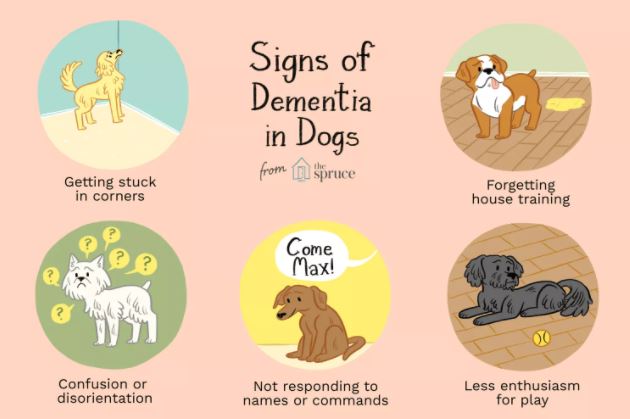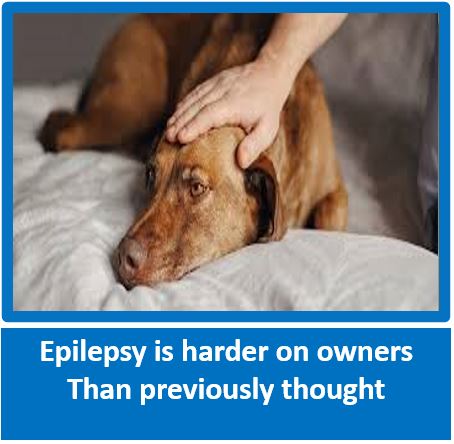
GENRIC Pet Insurance is the most innovative pet insurance product (not a pet medical aid) in SA. It is designed to cover the unexpected, unforeseen, and fortuitous veterinary costs that cats and dogs kept as household pets may incur as a result of illness or injury. Its development took cognisance of the strengths and weaknesses of other policies and therefore avoids their shortcomings from day one.
Causes, signs and treatment of dementia and senility in dogs
www.thesprucepets.com www.thesprucepets.com- a great website with an enormous variety of articles and information on a wide collection of pets, including, but not limited to rodents, reptiles, aquariums, hedgehogs, horses, birds and so much more
www.thesprucepets.com www.thesprucepets.com- a great website with an enormous variety of articles and information on a wide collection of pets, including, but not limited to rodents, reptiles, aquariums, hedgehogs, horses, birds and so much more

Let's face it, getting old is for the birds. Aging dogs can show worrisome behavior changes including confusion, irritability, and disorientation. Senior dogs, just like humans, can experience changes in the brain that affect memory, comprehension, and more leading to senility and dementia. Symptoms usually develop slowly but can appear to come on quickly due to a stressful event. So don't just write it off if Fluffy forgets things like your daily walking route.
What Is Dementia?
Similar to Alzheimer's disease in humans, dementia in dogs primarily affects memory, learning, and comprehension.1 Canine cognitive dysfunction, as the condition is officially named, affects a fairly high number of senior dogs. Yet with proper treatment and management, you can help your prized pet remain healthy and happy for as long as possible.
Symptoms of Dementia in Dogs
You may notice your dog walking up to the wrong side of a familiar door, acting dazed—staring off into space like "nobody's home"—or wandering and pacing about your house. This general confusion and disorientation can work its way into every aspect of your dog's life, like forgetting where its food bowls are or inexplicable accidents. Doggie dementia can even affect sleep patterns leading dogs to seem restless at night, tossing and turning, vocalizing, or standing "on guard." Other symptoms of canine cognitive dysfunction can include a change in personality or temperament, lack of enthusiasm for games, and decreased interaction with loved ones.
These signs usually develop gradually and get worse over time, but they can also be caused by various other medical problems. Any dog exhibiting signs of dementia should be seen by a veterinarian to rule out other health issues like blindness, deafness, urinary tract infections, kidney disease, arthritis, or tumors, infections or inflammation of the brain.
What Is Dementia?
Similar to Alzheimer's disease in humans, dementia in dogs primarily affects memory, learning, and comprehension.1 Canine cognitive dysfunction, as the condition is officially named, affects a fairly high number of senior dogs. Yet with proper treatment and management, you can help your prized pet remain healthy and happy for as long as possible.
Symptoms of Dementia in Dogs
You may notice your dog walking up to the wrong side of a familiar door, acting dazed—staring off into space like "nobody's home"—or wandering and pacing about your house. This general confusion and disorientation can work its way into every aspect of your dog's life, like forgetting where its food bowls are or inexplicable accidents. Doggie dementia can even affect sleep patterns leading dogs to seem restless at night, tossing and turning, vocalizing, or standing "on guard." Other symptoms of canine cognitive dysfunction can include a change in personality or temperament, lack of enthusiasm for games, and decreased interaction with loved ones.
These signs usually develop gradually and get worse over time, but they can also be caused by various other medical problems. Any dog exhibiting signs of dementia should be seen by a veterinarian to rule out other health issues like blindness, deafness, urinary tract infections, kidney disease, arthritis, or tumors, infections or inflammation of the brain.
Causes of Dementia
A definitive cause of dementia in dogs is not yet known. Canine cognitive dysfunction may be associated with the depletion of a neurotransmitter called dopamine, although the cause of the depletion hasn't been identified. Another possible cause is an accumulation of proteins or a build-up of plaque (similar to Alzheimer's) that disrupts nerve impulses.1
Treatment
If your dog is showing signs of senility or dementia, visit your veterinarian for an examination and consultation. Your vet will go over your dog's health history and conduct a thorough examination. Diagnostic testing like blood work and urinalysis may be recommended to check for other health problems. Based on these findings, additional tests may be ordered, including X-rays, a CT scan, or an MRI.
Once other health issues have been ruled out, your vet might determine that your dog has canine cognitive dysfunction. And while a diagnosis of dementia can be difficult to handle, many dogs go on to live a happy, healthy life when given proper care and attention. There is no cure for dementia in dogs. It is a progressive degenerative disease, meaning it will get worse over time. However, there are some things that can be done to make you and your dog more comfortable. A prescription drug called Anipryl helps alleviate some symptoms of cognitive dysfunction in certain dogs. This drug works by prolonging dopamine activity in the brain. Anipryl is given orally, once daily, and does not work for all dogs, but side effects are fortunately mild and uncommon unless the medication is inappropriately used in conjunction with other drugs like ephedrine, opioids, phenylpropanolamine, amitraz, and several classes of antidepressants.
Additional practices include developing a daily routine for feeding, exercise, and other activities.And stick to it. Make sure your dog gets plenty of exercise, ideally out in the sun. This helps manage its level of anxiety and promotes nighttime sleep. Soothing music and aromatherapy may work, too. Spend quality time together, strengthening the human-canine bond and don't leave your dog home for extended periods of time. Also, avoid rearranging your furniture, moving your dog's belongings, or making any other changes in its living environment.
Dietary Supplements for Dogs With Dementia
Supplements such as omega-3 fatty acids, SAMe, medium-chain triglycerides (MCT), antioxidants, Denamarin, silybin, vitamin E, Cholodin, Solliquin, and melatonin, seem to improve cognitive function or quality of life in some dogs.3 Talk to your veterinarian for information about dosing and help with finding the right supplements for your dog. There are also homeopathic treatments, herbal remedies, and other nutritional supplements said to benefit dogs with cognitive dysfunction. One of these is called Neutricks (apoaequorin), which is made from a calcium-binding protein found in a specific species of jellyfish. Chinese herbs may also be helpful for some dogs. Consult a vet who practices traditional Chinese veterinary medicine and acupuncture for a consultation.
Prevention
Unfortunately, there is no specific way to prevent dementia in dogs. But keeping your dog active, healthy and mentally stimulated should help keep its mind sharp. Teach it fun tricks and games—those that challenge its brain and that it can play throughout its life. Also, feed your dog a high-quality food, void of fillers, and maintain a good exercise routine.
A definitive cause of dementia in dogs is not yet known. Canine cognitive dysfunction may be associated with the depletion of a neurotransmitter called dopamine, although the cause of the depletion hasn't been identified. Another possible cause is an accumulation of proteins or a build-up of plaque (similar to Alzheimer's) that disrupts nerve impulses.1
Treatment
If your dog is showing signs of senility or dementia, visit your veterinarian for an examination and consultation. Your vet will go over your dog's health history and conduct a thorough examination. Diagnostic testing like blood work and urinalysis may be recommended to check for other health problems. Based on these findings, additional tests may be ordered, including X-rays, a CT scan, or an MRI.
Once other health issues have been ruled out, your vet might determine that your dog has canine cognitive dysfunction. And while a diagnosis of dementia can be difficult to handle, many dogs go on to live a happy, healthy life when given proper care and attention. There is no cure for dementia in dogs. It is a progressive degenerative disease, meaning it will get worse over time. However, there are some things that can be done to make you and your dog more comfortable. A prescription drug called Anipryl helps alleviate some symptoms of cognitive dysfunction in certain dogs. This drug works by prolonging dopamine activity in the brain. Anipryl is given orally, once daily, and does not work for all dogs, but side effects are fortunately mild and uncommon unless the medication is inappropriately used in conjunction with other drugs like ephedrine, opioids, phenylpropanolamine, amitraz, and several classes of antidepressants.
Additional practices include developing a daily routine for feeding, exercise, and other activities.And stick to it. Make sure your dog gets plenty of exercise, ideally out in the sun. This helps manage its level of anxiety and promotes nighttime sleep. Soothing music and aromatherapy may work, too. Spend quality time together, strengthening the human-canine bond and don't leave your dog home for extended periods of time. Also, avoid rearranging your furniture, moving your dog's belongings, or making any other changes in its living environment.
Dietary Supplements for Dogs With Dementia
Supplements such as omega-3 fatty acids, SAMe, medium-chain triglycerides (MCT), antioxidants, Denamarin, silybin, vitamin E, Cholodin, Solliquin, and melatonin, seem to improve cognitive function or quality of life in some dogs.3 Talk to your veterinarian for information about dosing and help with finding the right supplements for your dog. There are also homeopathic treatments, herbal remedies, and other nutritional supplements said to benefit dogs with cognitive dysfunction. One of these is called Neutricks (apoaequorin), which is made from a calcium-binding protein found in a specific species of jellyfish. Chinese herbs may also be helpful for some dogs. Consult a vet who practices traditional Chinese veterinary medicine and acupuncture for a consultation.
Prevention
Unfortunately, there is no specific way to prevent dementia in dogs. But keeping your dog active, healthy and mentally stimulated should help keep its mind sharp. Teach it fun tricks and games—those that challenge its brain and that it can play throughout its life. Also, feed your dog a high-quality food, void of fillers, and maintain a good exercise routine.





